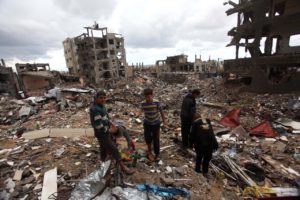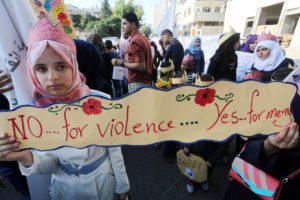(THIS ARTICLE IS MACHINE TRANSLATED by Google from Norwegian)
Hisham Abu Muammar stares at an empty notebook he just bought in the small bookstore in Gaza City. He bought it despite the fact that fine notebooks fall under the category of unnecessary luxury goods. For ten years his city has been occupied.
For as long as his life has been without direction. He cannot travel to any other country in the world. He cannot even travel to the cities of the Palestinian territories in the West Bank. The pages in the notebook are unlikely to be filled by important milestones.
Hisham is 31 years, educated engineer from the Department of Urban Planning, but he does not think he will ever have the opportunity to practice his profession. The notebook he bought is in black leather and has a title on the cover: Diary 2016. It will end up in the same pile as the other nine diaries he has purchased since he decided to write down everything he experiences, and which is almost exclusively a painful experience.

An equation that never goes up. In January this year, Gaza signed an agreement on the Israeli blockade, but the agreement is drowning in economic, humanitarian and political crises. The blockade was gradually introduced after Hamas won lawful elections in 2006. Israel was quick to declare Gaza hostile territory, and then waged three devastating wars against the area.
For Hisham, who spends much of his time at the beach with friends from college, emigrating to Europe is the only opportunity for real change in life. A rather unrealistic but highly vivid dream.
"We are trying to achieve the impossible," Hisham told Ny Tid. "We will travel to Egypt as soon as the border, which was closed several months ago, is reopened. From there we will go to Turkey to get on to any European country, so that we can realize our dreams. Gaza does not function as anything other than a large prison, possibly as a path to suicide. "
He thinks about it, and adds: "There is no room for dreams in Gaza. We who live here live as victims of the fist of yet other victims – from the time before Hamas, who fought to gain control of Gaza. Life here is like solving an incomprehensible equation that never goes up. We live in a confusion that is constant. "
According to unofficial statistics obtained by Ny Tid from travel agencies and tourist agents in Gaza, about 2000 people aged 24-33 have registered for departure, hoping to emigrate to Europe.
Sami Abd al-Malik, 40, who oversees the secret tunnels connecting Gaza with Egypt, says many young people are trying to negotiate with him to be smuggled into Egypt. He himself is too scared to have problems with the authorities in Gaza and be arrested, so he does not get involved. In any case, smuggling has become extremely difficult after Egypt tightened its security over the tunnels and flooded parts of them with water, says Sami. "The despair the young people live in here makes them pay up to $ 5000 just to be smuggled out into the Egyptian desert," he says. "In addition, they have to pay to be shipped to Greece or Turkey, and then to Europe."
Dangerous situation. Nearly two million people live on this narrow strip of the east coast of the Mediterranean. 40 percent of them live below the poverty line. In addition, half of the population is completely dependent on international aid. In addition, it is estimated that 43 per cent of families experience gender-based domestic violence. At least half of the children need psychological help that is not available.
"The situation in Gaza is extremely dangerous. There are no prospects for improvement in either the economy or living conditions, and the situation is getting worse with each passing hour, "said Rami Adro, director of the Euro-Mediterranean Human Rights Center. "Everyone fears that we are facing a new round of violence. I think people here have lost the spark of life it takes to adapt and survive. It's hell in the true sense of the word. The uncertainty regarding access to food has become unbearable; one has no idea when one can actually count on having something to eat. It will be a disaster if the blockade continues, it hits the people directly in the lifeblood. "
Israel continues to control virtually every aspect of the lives of two million Palestinians, so they never have any hope of building a future that contains anything positive. Thousands of people live in a vacuum of international oblivion. Everyone is concerned about other issues in the Middle East – such as Syria, Yemen and Libya.
Isra 'Qudus is 37 years old and runs a kindergarten in Gaza City. Every month she has to fight to get what she needs for the household. At home, she stores dozens of cans, and always makes sure to have three bags of flour that have not expired. Isra ', who is herself a mother of five, says that she makes sure to have so much food stored because they constantly expect new military attacks. "You can't get any food from outside when the war starts. Then there are only ghosts in the streets, and no other sounds than gunshots, "she says.

Three warriors. Adham Abu Salmiya is a spokesman for the Committee to lift the blockade, and believes it is precarious that the siege stops now, and not least that reconstruction can begin. He tells Ny Tid that the population of the Gaza Strip has increased by half a million people over the last ten years. "Of course, these people need education, health care, housing and other infrastructure – but virtually the entire infrastructure is congested," he says. "Unfortunately, the siege continues despite the fact that international human rights organizations have long pointed out that the blockade must be lifted and that the border crossings in the Gaza Strip must be opened. They have also condemned Israel's war crimes against the Palestinians, which can be compared to genocide. Still, nothing happens. "
Gaza has been through three wars in a row – in such a short period of time that even ten-year-olds can remember all three. The first of the wars started in 2008, when Israel launched "Operation Cast Lead", which lasted 22 days. It was followed by a week-long war called "Operation Pillar of Defense". The last and most brutal war was started in the summer of 2014. It lasted for 51 days, and was named "Operation Protective Edge".
"If the international community had refused Israel to punish the people here – effectively, not just by boycotting settlements – we could have seen an end to all these violations of international law. "We could have removed and arrested those who have committed war crimes and crimes against humanity," said Abu Salmiya.
There is no doubt that the blockade is a collective punishment against two million Palestinians for having chosen Hamas in legal elections.
We follow Hisham home, or more precisely: to the gravel mound of a ruin he calls a home. There used to be thousands of homes here. They collapsed after the war in the summer of 2014, when the neighborhoods in eastern Gaza were subjected to heavy bombardment. Hisham has lived here all his life.
"These concrete blocks have not been repaired. They have been like that through winter and summer – and winter and summer again. 100 people still live in temporary housing camps as a direct consequence of this lack of basic infrastructure. We do not get to cover completely basic human needs, "he says, and continues:
"I wonder why the Gaza Strip does not end up in the Guinness Book of Records. They could set the record for the highest unemployment rate in the world. Or the record for the largest outdoor prison, which has also been in operation for the longest time in history. "
Translated from Arabic by Vibeke Koehler.


